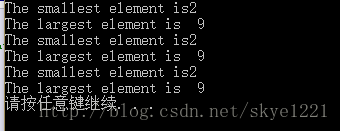C++头文件algorithm 3——Min/Max
| 函数 | 功能 |
|---|---|
| min | 返回最小元素 |
| max | 返回最大元素 |
| minmax | 返回最小和最大元素 |
| nin_element | 返回一定范围内的最小元素 |
| max_element | 返回一定范围内的最大元素 |
| minmax_element | 返回一定范围内的最小和最大元素 |
min
example
#includemax
example
#includeminmax
结果返回一对值:a和b。第一元素是最小值,第二个元素是最大值。
example
#includemin_element&max_element
ForwardIterator min_element (ForwardIterator first, ForwardIterator last, Compare comp);
结果返回一个迭代器,它指向某个范围内最小或最大元素;如果这个范围为空,则返回comp。
example
#includecout << "The largest element is " << *max_element(myints, myints + 6)<//using function as comp
cout << "The smallest element is" << *min_element(myints, myints + 6,myfunction)<cout << "The largest element is " << *max_element(myints, myints + 6,myfunction)<//using object as comp
cout << "The smallest element is" << *min_element(myints, myints + 6,myobject)<cout << "The largest element is " << *max_element(myints, myints + 6,myobject)<return 0;
} minmax_element
example
#include



